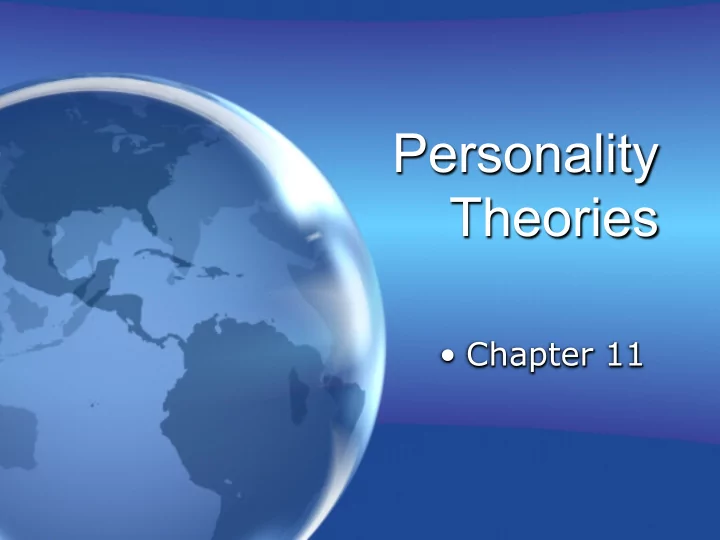

Personality Theories • Chapter 11
Personality • Concept of personality – Most clearly embodies the notion of behavioral consistency • Personality factors – clusters of behavior tendencies that occur together
Psychoanalytic Perspective - Sigmund Freud • Conscious/ unconscious – Ego – Superego – Personal Unconscious • Unconscious – Id
Sigmund Freud - Defense Mechanisms • Denial • Repression • Regression • Projection • Reaction formation • Displacement • Intellectualization • Rationalization
Sigmund Freud - Defense Mechanisms
Sigmund Freud - Dreams • “ Royal road to the unconscious ” • Manifest dream • Latent dream • Use in therapy – free Salvador Dali association; slips of tongue
Carl Jung - Parts of Personality • Conscious • Personal Unconscious • Collective Unconscious – Inherited universal ideas – Archetypes - innate universal psychic dispositions- part of nervous system
Carl Jung - Archtypes • Inherited biological memories– examples - • Persona • Animus; anima • Shadow • Self
Carl Jung- Personality Types • Thinking • Feeling • Sensation • Intuition
Alfred Adler- Social Equality • Inferiority Complex • Teleology = future orientation • Family Council • Education
Karen Horney - Inner Conflicts • Anxiety • Coping strategies • Three personality types- – Moving toward people – Moving against people – Moving away from people
Karen Horney – Sadism • End of a severe neurosis • Early childhood abuse • Hopelessness • Numb to feelings • Style of relationships
Existentialism - Viktor Frankl • Existentialism • Theory – Will to meaning – Suffering has meaning – Conscience = unconscious spirituality – Existential vacuum • Boredom • “ Sunday neurosis ” • Therapy = logotherapy
Chapter 11 Review • Definitions – personality, etc. • Basic structure, parts, functions of each theory • Psychoanalytic Perspective – F reud – unconscious, defense mechanisms, anxiety – Jung – collective unconscious; archtypes – Adler – perfectionism: inferiority complex – Horney – anxiety; three types of people; sadism – Frankl – existentialism theory; logotherapy
Humanist Perspective • Importance of free will and personal choice • People are basically good • Unconditional positive regard • Self-actualization
Humanist Theories - Eric Fromm • Loneliness • Society to blame • Needs- – Relatedness - loss with nature – Transcendence - over animal nature to become creative – Rootedness - belonging – Sense of personal identity – Frame of reference - stability
Eric Fromm- Character Orientations • Receptive -dependency • Exploitative - takers • Hoarding - misers • Marketing- selves • Productive – value others • Necrophilus • Biophilous • Concept of love - society
H umanist Theories – Carl Rogers • Structure of Personality – – Organism – Self – Organism and Self
Carl Rogers – Structure of Personality Organism – • Phenomenal field - person ’ s perception of his subjective reality – has one motive: self- actualization; innate Self – • Pattern of conscious perceptions and values • Develops out of O; interacts with E • Strives for consistency • Perception, not what is, is important Ideal self – ever changing
Carl Rogers - Structure of Personality Organism and Self- • Congruence / Incongruence - Between subjective reality and external reality - Between self and ideal self
Carl Rogers - Development of Personality • Self-actualization • Anxiety – Outcome of discrepancy between one ’ s distorted self-concept and actual experience - felt as threat • Defense mechanisms – Denial – Distortion • Self-serving bias
Trait Theory- Raymond Cattell • Focus on description of behavior • Five traits at core of personality • Research confirms genetic components in certain personality traits. • More concerned with describing behavior than explaining it.
Assessing Personality • Ps ychological Tests – Standardized – Norms – Reliability / validity • Self-Report Measures – MMPI – Campbell-Strong • Projective tests – Rorschach – TAT • Behavioral assessment • Battery of tests
Chapter 11 Review Humanistic Perspective • Fromm – loneliness; needs; character orientations • Rogers –phenomenal field; discrepancies and incongruencies; anxiety; unconditional positive regard; Trait Theory • Cattell – psychological testing; MMPI
Social-Cognitive Approach- George Kelly • Personal Construct Theory - Each person creates a set of unique cognitive constructs about environment. Prediction. • Construct Alternativism - We are free to revise or replace constructs with other alternatives. Adaptability. • Processes - Ways we anticipate events. Future oriented for control; consequences.
Social-Cognitive Approach- George Kelly • Cognitive Complexity – Ability to discriminate, see variety among people • Cognitive Simplicity- Less discrimination • Fixed Role Therapy – Client first plays a role, then lives it
Film – Social Cognition Model
Social-Cognitive Approach - Albert Bandura • Basic idea - behavior is influenced by interaction between individual and situations • Beliefs, thoughts, cognitive activity important - cancer; Simonton studies
Social-Cognitive Approach - Albert Bandura • Latent learning without reinforcement • Observational learning – pioneered research • Violence on TV
Social-Cognitive Approach - Albert Bandura • Terms – – Vicarious reinforcement – Disinhibition - • weakening of a restraint thru exposure to a model – ex. mobs – Self-reinforcement - • can be tangible or emotional
Social-Cognitive Approach - Albert Bandura • Self-efficacy - – learned expectations regarding one ’ s success in performance of certain behavior • Reciprocal determinism - – interaction between individuals and E • Triadic reciprocity – – behavior, cognition, and E variables are reciprocal determinants of each other
Biological & Evolutionary Approaches - Daniel J. Siegel • Nature vs. nurture - – Genetic components in temperament • State of mind- – Repeated patterns of activity in brain become engrained • Self-states- – Multiple selves • Authentic self-states
Film – Personality Brain
Exploring the Self • Self-esteem • Self-serving bias • Individualist vs. collectivist cultures
Chapter 11 Review Social-Cognitive Perspective • Kelley – personal construct theory; cognitive complexity / simplicity; fixed role therapy • Bandura – interaction between individual and situations; disinhibition; self-efficacy; reciprocal determinism
Chapter 11 Review Biological Perspective • Siegel – states of mind; authentic self- ‐ states; reality Self • Self ‐ esteem; self ‐ serving bias; individualist/ collectivist culture
Recommend
More recommend